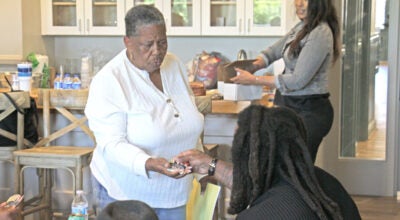Workshop will help bakers sell from home
Published 9:58 pm Wednesday, April 1, 2015
Bakers that are looking to sell their homemade goods from home or at farmers markets can get certified next week at a workshop hosted by the Dallas County Extension Center.
The center is hosting a workshop to teach home producers about the Alabama Cottage Food Law.
The law, which went into effect in June 2014, allows people to produce and sell goods from home like cakes, cookies, jams and jellies.
“There are a lot of people who are excellent bakers in the country,” said County Extension Coordinator Callie Nelson. “People might always want to be able to sell their goods. This is a way they can sell them and make money.”
The workshop will be held Saturday, April 11 from 9 a.m. until 12 p.m. at the Central Alabama Farmer’s Co-op.
The training session will help individuals understand the law and how to become certified by going through a food safety course.
The course, which is taught by a regional extension agent in food safety, will show participants how to handle food temperatures, cross contamination and how to properly utilize cooking utensils.
After going through the training session, participations will be given a test that will allow them to earn their needed certification.
“They don’t have to have a license to sell because that certification gives them the comfort they don’t have to worry about doing that part,” Nelson said.
Although individuals might gain certification, there are still some stipulations.
Individuals are not allowed to sell to stores or markets that will resale the goods.
Home producers have to sell directly to consumers, who will directly use the goods. Farmers markets, churches and street festivals are amongst the places individuals are allowed to sell their goods.
Food preparation is regulated as well. Bakers can sell nonhazardous foods like cookies, breads and dried herbs, but they are not allowed sell anything that requires refrigeration after the food has been prepared, including pies with custards and fillings.
The cost to attend the event will be $25. For more information and to register visit the website at www.aces.edu/foodsafety.com or call 875-3200.
The center is hosting a workshop to teach home producers about the Alabama Cottage Food Law.
The law, which went into effect in June 2014, allows people to produce and sell goods from home like cakes, cookies, jams and jellies.
“There are a lot of people who are excellent bakers in the country,” said County Extension Coordinator Callie Nelson. “People might always want to be able to sell their goods. This is a way they can sell them and make money.”
The workshop will be held Saturday, April 11 from 9 a.m. until 12 p.m. at the Central Alabama Farmer’s Co-op.
The training session will help individuals understand the law and how to become certified by going through a food safety course.
The course, which is taught by a regional extension agent in food safety, will show participants how to handle food temperatures, cross contamination and how to properly utilize cooking utensils.
After going through the training session, participations will be given a test that will allow them to earn their needed certification.
“They don’t have to have a license to sell because that certification gives them the comfort they don’t have to worry about doing that part,” Nelson said.
Although individuals might gain certification, there are still some stipulations.
Individuals are not allowed to sell to stores or markets that will resale the goods.
Home producers have to sell directly to consumers, who will directly use the goods. Farmers markets, churches and street festivals are amongst the places individuals are allowed to sell their goods.
Food preparation is regulated as well. Bakers can sell nonhazardous foods like cookies, breads and dried herbs, but they are not allowed sell anything that requires refrigeration after the food has been prepared, including pies with custards and fillings.
The cost to attend the event will be $25. For more information and to register visit the website at www.aces.edu/foodsafety.com or call 875-3200.




